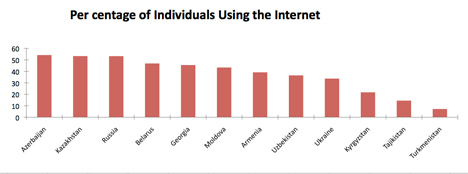
The Courts have acquiesced, the populace is compliant and the Democratic Party is splintered. Without any way to make their opposition felt, Trump’s opponents’ only hope is that the economy will cause MAGA voters to rethink.
As the use of the Internet in the post-Soviet space continues to evolve, Natalya Ryabinska shows how tools of control, surveillance and propaganda are more than up to the task of hindering online sources that promote democratization. Once again, the fate of civil society hangs in the balance.
The Arab revolutions in 2011-2012, in which new technology played an important part in mobilizing protests, led scientists to again talk about the liberalizing potential of the Internet, and its increased role in the democratization of countries characterized by semi-democratic or authoritarian transitional regimes. This idea has its own ardent supporters (such as Ronda Hauben and Peter Golding) as well as opponents (or at least sceptics). For example, in his outstanding book The Net Delusion: The Dark Side of Internet Freedom, Evgeny Morozov shows that the Internet can be successfully used not for political liberalization but rather for sustaining authoritarian regimes in post-Soviet states. Clearly, this vast debate is far from being over but the existing literature allows us to assume that the Internet can produce different policy outcomes in different environments. Therefore, instead of looking for the answer to questions such as “How does the Internet change closed societies?”, we should try to understand how the Internet influences politics and society in particular countries during a particular period of time.

Photo: Martin Börjesson. Source: Flickr
Understanding the weaknesses of trying to speak about the entire region, rather than individual countries, even if it is bound by recent common history of being part of one state, I will try to highlight issues which deserve attention, and provide an outline of the current situation in the post-Soviet (non-Baltic) States.
The Internet has entered the reality of post-Soviet societies very quickly. Internet penetration in the post-Soviet states is quite high: according to the International Telecommunication Union, the percentage of individuals using the Internet in 2012 was 54.2 per cent in Azerbaijan, 53.27 per cent in Russia and 45.5 per cent in Georgia (see graph). This is comparable, for example, to France (47.93) or Spain (50.37) in 2006. On the other hand, this penetration is uneven as access to the Internet remains problematic for a significant part of society in the post-Soviet states due to technological or economic reasons. In Russia, the size of the community in which a person lives is still one of the main differentiating factors for Internet usage: Muscovites are 3.6 times more likely to use the Internet than rural inhabitants. In Azerbaijan, users complain of low speed access to the Internet in some regions. And in Uzbekistan, the price for Internet access remains beyond the reach of large segments of the population.

Source: International Communication Union
How free is the Internet from political and economic constraints in the non-Baltic post-Soviet countries? To what extent does it increase the range of information and opinions available to the public? In many of these countries, the Internet is a space where post-Soviet societies living with “partly free” or “not free” media, are able to find information about events and issues, which governments try to hide from them. It is also a place where they can hear voices of opposition politicians, for whom it is difficult, or its nearly impossible, to access the mainstream media.
Such information and news are provided primarily by independent online media as well as online versions of independent traditional media, which are difficult to access offline because of barriers created by the authorities. News websites such as Ukrainska Pravda (founded by Georgiy Gongadze) in Ukraine, Netgazeti in Georgia, Belorusskiy partizan in Belarus, as well as online versions of the Russian Novaya gazeta (Anna Politkovskaya was among its star reporters), offer their readers independent journalism; they write about the abuse of power by government officials, shed light on events and topics important for people and rarely mentioned by the popular media. Other important alternative sources of information and analysis of current events are provided by blogs, social networks, sites of domestic and international NGOs, as well as sites of Western mass-media (BBC, Radio Free Europe).
The size of the web-based media audience is still considerably small compared to the size of the television audience in post-Soviet states, where television is the source of news for the vast majority of citizens. However, these web-based media can be quite influential. A month after Ukrainska Pravda published an investigation into the excessively luxurious life of the son of former president Viktor Yushchenko in 2005, the president’s popularity rating dropped by nearly 15 per cent. Undoubtedly, a significant role was played by the fact that the topic was picked up by a number of the traditional media, including some television stations. This was possible thanks to the relatively high level of freedom of speech, which Ukrainians enjoyed in the first years after the Orange Revolution.
After Viktor Yanukovych won the presidential elections, a significant roll-back of Ukraine’s democratic developments took place, and the authorities have “cut off the flow of negative information from the Internet on TV”, as Sergey Leshchenko, the well-known investigative reporter of Ukrainska Pravda, noted. In other words, the types of investigations made by independent Internet media journalists, often gave impetus for TV programmes to further promote anti-corruption investigations under President Yushchenko. Today, however, online information about corruption among high officials almost never makes it to the traditional media.
The role of the Internet (independent news sites, blogs, social networks) in the political and public life of post-Soviet states is particularly significant in politically critical moments, such as mass protests against electoral fraud. For example, after the parliamentary elections in December 2011, when tens of thousands of Russians went to the streets to protest against the results of elections, the main national TV stations completely ignored them. Only the Internet-based independent TV station Dozhd covered them extensively and professionally. In the end, the mainstream channels were forced into covering the event as it was so widely discussed by Dozhd and other online media, including blogs and social networks. It is noteworthy that the full coverage of the mass protests led to a significant increase in popularity of the niche TV channel. The day it covered the protests, 10 December, the channel had one million unique visitors – it took the whole month of October to get a similar audience size. Since December 2011, Dozhd has been averaging 800,000 unique visitors per week, according to brand manager Darya Simonenko. Similarly, during the 2009 so-called Twitter revolution in Moldova (mass protests in response to the reportedly fraudulent parliamentary elections), the online media were the only timely source of information for Moldovan citizens about the unrest, which led to the increase in popularity of web-based media. It is worth noting that the Internet played a significant role in terms of both informing and organizing the protests. Can we thus conclude that the Internet is a factor of democratization in post-Soviet societies, supporting the freedom of expression, promotion of political engagement and the formation of civic attitude? The answer to this question is not unequivocally positive.
Firstly, although the independent Internet-based media often display events in post-Soviet countries in a much more comprehensive and adequate way than the traditional media, which are controlled by governments or politically dependent on the owners, they remain less popular and less people trust them. According to data from the Levada Center in 2013, despite the relatively high Internet penetration rate in Russia, 88 per cent of people regard television as the most important source of news. While 24 per cent prefer to learn news from friends, relatives and neighbours, only 21 per cent of respondents obtain information from online publications. As for the credibility of various media, 51 per cent of Russians trust TV news, 16 per cent trust news from friends, relatives and neighbours, and only 14 per cent trust online publications. In Ukraine, television also remains the leader in informing citizens about political news (90 per cent of the population), while the Internet is only the main source of information for 21 per cent of the population.
Secondly, research carried out in Russia and Ukraine show that even if people receive their information about what is happening in the country from the Internet, it does not mean that they stop watching TV news and trust it. As Denis Volkov of the Levada Center in Russia shows, although independent Internet sites, blogs and social networks generate important topics, few among those who use the Internet as a source of news are actually familiar with these topics. The only guarantee that news concerning high-level corruption, harassment of independent media and anti-government protests, for example, will become known to the wider public including Internet users, is that they are covered by national television channels. This, in turn, depends on the freedom of expression in the traditional media of the country. It also depends on whether the opposition or NGOs covering such issues have the ability to set the agenda of the mainstream media, especially television.
Thirdly, there is an important question of whether knowledge about what is happening in the country which comes from independent online sources, motivates citizens of post-Soviet states to get involved in political activity. On the one hand, the most active members of society – the young, educated, employed – are currently gathered online in countries such as Russia and Ukraine. On the other hand, scientists and public activists in the post-Soviet region often underline the laziness and passivity of these educated and relatively wealthy young people, who have no desire to get involved in civic and political activities. Evgeny Morozov uses the term “slacktivism” to describe how instead of actual participation in politics with the risk of being arrested and repressed, Internet users tend to express their dissatisfaction with the government and politicians on Facebook and Twitter. It doesn’t change things, but satisfies their vanity. Ukrainian columnists and public figures like the concept of “letting off steam”, when they comment on the behaviour of users of social networks who “like”, “post” and “tweet”, but do not come out to protest “offline”.
Volkov draws attention to the fact that these Russian “netizens”, who have access to the whole variety of Internet resources (forums, blogs and networks), are often well aware of the activities of the opposition and its actions, but remain away from politics, as parties in opposition to the Putin regime don’t offer any ideas, proposals and values which appeal to the sympathy of the Internet community. There are similar claims towards opposition leaders in other post-Soviet states. Marc Lynch, a researcher of the Arab revolutions from the George Washington University, is correct when he insists that social media cannot substitute hard and patient party work or grassroots organizing. His conclusions correspond with the opinions of other researchers on the role of the Internet in political participation, who state that while the Internet can amplify political involvement, it is the underlying cause or organization which remains central to the activism.
Fourthly, although the Internet in post-Soviet countries is freer than the traditional media, it is still far from being without any political limitations. According to the 2012 Freedom House report “Freedom on the net”, only in Georgia and Ukraine does the Internet remain a relatively unobstructed domain of free expression. Kyrgyzstan, Kazakhstan, Russia and Azerbaijan are rated as “partly free” from the point of view of freedom of expression in the net, while Belarus and Uzbekistan are rated as “not free”. Governments of these countries widely use different methods to limit freedom of speech online: legal restrictions of freedom, blacklists, content blockage and removal, ownership control over the Internet, violence against critical bloggers and cyber-attacks. In Belarus, Russia and Uzbekistan, in particular, there are legal constraints of Internet freedom which make it possible to block websites and remove online content. The authorities of Azerbaijan, Belarus and Russia actively use cyber-attacks against independent media and blogging sites. Prominent bloggers and online activists are subjected to intimidation and physical attacks in Belarus, Kazakhstan, Uzbekistan and Azerbaijan; they are also often arrested in these countries (and also in Russia) for political and social writing.
Fifthly, Internet technologies are used by some post-Soviet governments to achieve far from democratic goals. In countries such as Russia and Belarus, the authorities use the Internet to “watch” their citizens. In Russia, legislation was approved in April 2007 allowing government services to intercept data traffic without a warrant. The Russian authorities regularly demand Internet providers to disclose their users’ data. In April 2011, donors to the Russian anti-corruption website Rospil.info received calls and emails from unknown people (allegedly members of the pro-Kremlin youth movement) asking about their donations. Previously all donors had sponsored money via the aforementioned crowd-funding site Yandex.Money. In May 2011, Yandex.Money confirmed it had released Rospil.info donors financial and personal information to the FSB.
Last but not the least, post-Soviet governments not only make efforts to supervise and control society and the Internet, they also try to become active players in the online environment. They use pro-government news websites and hire numerous paid online commentators to manipulate online discussions in Internet forums, social networks and blogs. In order to influence the blogosphere in Russia, they create pro-government content and pro-Kremlin comments, with activists of the pro-government youth organization Nashi and Molodaya Gvardiya often being involved. Propagandist commentators actively participate in online discussions about the political opposition, dissidents such as Mikhail Khodorkovsky and the assassinations of journalists. The technique of paid pro-governmental commentators is used by politicians and power holders to manipulate public opinion, to thwart online discussions on independent websites and undermine public trust in the independent sources of information on the Internet.
Another technique employed by post-Soviet governments is using the Internet to discredit online activists and opposition politicians. The private telephone conversations of opposition politician Boris Nemtsov talking in a critical way about other opposition leaders were made public in Russia in 2011. In Ukraine, the Internet has been used to defame the jailed former prime minister, Yulia Tymoshenko.1
The development of new communication technologies alone is not enough for democratization of transitional societies. The post-Soviet states with the highest Internet penetration rates such as Russia, Azerbaijan, Kazakhstan and Belarus, are autocracies. They also represent the lowest level of democratic progress (i.e. consolidated authoritarian regimes). At the same time, countries with a much more modest proportion of Internet users among its population – Georgia, Moldova and Ukraine – have demonstrated significantly higher level of democratic freedoms than the aforementioned group, and are respectively rated as hybrid regimes. Under the conditions of a weak civil society typical of post-Soviet states, it is probably especially important, how determined the authorities are to restrain freedom of expression online and whether they are able to use new technologies for prolonging their stay in power. The example of Russia, where the government systematically develops and successfully employs diverse and versatile tools of control, surveillance and propaganda, shows how the spread of the Internet can serve purposes other than democratization. The influence of international actors is also an important variable which may influence Internet-related policies in the post-Soviet space. For example, in the case of Ukraine and Moldova, which are not as strong international players as Russia, the desire of political leaders to take control of the Internet is hindered by the prospect of a negative reaction in the European Union and the United States. The ability of society in post-Soviet states to resist the intrusions on Internet freedom is also very important. For example, when a draft law combating child pornography, which had been regarded by human rights defenders and media experts as an attempt to limit freedom of expression online, was passed in the first reading in Ukrainian parliament in 2008, the Internet community and NGOs organized an active campaign around this event. As a result, the most controversial norms were removed from the law.
The use of the Internet in the post-Soviet space continues to evolve. While on the one hand it has shown itself to be a space where freedom of speech and civil society can develop, it has also become a space which the authorities can successfully use as a tool of control and propaganda. The experience of Eastern Europe, a region that is still in transition and transformation, shows that where the authorities understand the political potential of the Internet and new media and have enough power and resources to control them, the spread of the Internet may not necessarily lead to democratic developments. What is certain is that the Internet can produce different policy outcomes in different environments, and this can help us better understand how the Internet influences politics and society in this region.
See Tatiana Zhurzhenko, "Yulia Tymoshenko's two bodies", 25 June 2013, Eurozine, www.eurozine.com/articles/2013-06-25-zhurzhenko-en.html
Published 9 October 2013
Original in Russian
Translated by
Igor Lyubashenko
First published by New Eastern Europe 4/2013
Contributed by New Eastern Europe © Natalya Ryabinska / New Eastern Europe / Eurozine
PDF/PRINTSubscribe to know what’s worth thinking about.

The Courts have acquiesced, the populace is compliant and the Democratic Party is splintered. Without any way to make their opposition felt, Trump’s opponents’ only hope is that the economy will cause MAGA voters to rethink.

Elected in 2022 on a wave of popular hope, Colombia’s leftwing leader Gustavo Petro has failed to negotiate peace with the country’s armed groups and embarked on a ruinous tariff war with Donald Trump. A portrait of the president hampered by his own revolutionary nostalgia.